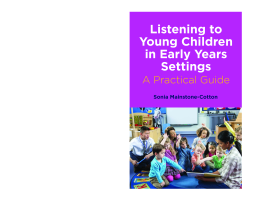
Additional Information
Book Details
Abstract
It is widely accepted that listening to and involving children in decisions about their care, learning and development can significantly improve the quality of early years provision. This book gives practical guidance on how to do this effectively.
Starting with a discussion about why we listen to children and the policies around this, the book explains how we can involve children in decision-making that is appropriate to their age and level of understanding. Packed full of examples and ideas that can be easily applied in practice, it covers how to listen to children's perspectives and involve them in staff recruitment and appraisals, classroom design, assessment processes for social services and EHC plans, and much more.
Table of Contents
| Section Title | Page | Action | Price |
|---|---|---|---|
| Listening to Young Children in Early Years Settings: A Practical Guide by Sonia Mainstone-Cotton | 3 | ||
| Introduction | 9 | ||
| Section 1. Why We Listen to Children | 15 | ||
| Chapter 1. What is Listening to Children? | 17 | ||
| Chapter 2. The Policy of Listening to Young Children | 31 | ||
| Chapter 3. The Consequences of Not Listening to Children | 39 | ||
| Section 2. How We Listen to Children | 47 | ||
| Chapter 4. Children’s Voice in Recruitment | 49 | ||
| Chapter 5. Children’s Voice in Transition | 59 | ||
| Chapter 6. Children’s Voice in Learning and Planning | 71 | ||
| Chapter 7. Children’s Voice in Redesigning Classroom and Outdoor Spaces | 79 | ||
| Chapter 8. Children’s Voice in Community Spaces | 87 | ||
| Chapter 9. Children’s Voice in Assessment | 95 | ||
| Chapter 10. Children’s Voice in Family Support | 103 | ||
| Conclusion | 115 | ||
| Subject Index | 117 | ||
| Author Index | 120 | ||
| Blank Page |
